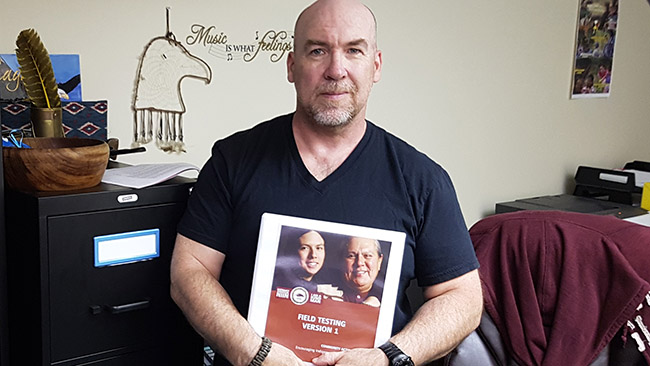Find their way: I am a Kind Man program working to blossom in Sudbury, across Ontario

By Laura E. Young
SUDBURY– Some Anishinabe men found violence as a normal way of life.
How did that happen? What did they witness in their lives?
What became their normal, before they ended up charged and convicted of violence against women?
Those are questions Greg Brown often ponders as the coordinator of I am a Kind Man Program. Kizhaay Anishnaabe Niin, at the N’Swakamok Native Friendship Centre in Sudbury.
Brown currently works with ten men ranging in age from early 20s to early 50s. Although a request was made to talk to a couple of his clients, at this point they were not yet ready to discuss the programming.
Across Ontario, there are 20 Kizhaay workers. Kizhaay works to reconnect men with their traditional, cultural duty as protectors of women and children, and to live a good life, Mino-Bimaadiziwin, according to the Kizhaay program literature.
The men who become Kizhaay clients are inside the justice system convicted of domestic violence. They learn of the Kizhaay through the aboriginal court workers and word of mouth, says Brown.
The first meeting is simply a discussion to see whether the man is eligible. It deals specifically with violence against a partner, Brown says.
Then there’s another appointment for intake and the first counselling session.
“They have to be en route to (healing). They have to want to do this program themselves,” says Brown, They can’t be taking it just to get out of court. “It has to be: ‘I want to help myself.’ I had one client who actually said, ‘I’m hurting inside. I have to help myself inside to heal.’”
Brown says he can tell by the man’s mannerisms and the way the talks whether he wants to try the Kizhaay program. “It’s not easy. That’s why we have certain questions that will guide us and guide them.”
The 13-week program includes 12 weeks of counselling and reconnecting with the Anishinabe way of life. “We look before colonization, how our men did not abuse the men or children, or each other. We were kind people and how we protected, not hurt our own.”
They reflect on the layers of spiritual teachings, of medicine and the Seven Grandfather Teachings. They go out on the land; they interact with other men and women.
“Through us, they can help get back on that path somewhere.”
He stays in touch after graduation. “I say this is a stepping stone on your journey, on your path. I’m a call away. I keep them as clients. You’re healed but you still need support.”
He connects the men to other friendship centre programs. “I have guys coming out for our social nights. There’s drumming.”
As well, of his 10 clients, two have found jobs while another has started school again; a fourth is debating returning to school.
“To me that’s a good stepping stone for them. It’s part of success for them.”
Brown has other plans for the program. “Ours isn’t considered mandated but down south, in Niagara, (my counterpart) has 23 people now. He’s asking his crown attorneys to write to ours. The program is working. His guys are doing really well.”
Brown also wants to help repurpose N’Swakamok Friendship centre land and refurbish the building. He says there are plans to have men and youth build a sweat lodge as well.
And Brown is working with local police services to hold a conference involving Kizhaay workers across Ontario and their clients to share their stories.
Kizhaay encourages a healthy, violence-free lifestyle through support, education and a peer-led learning environment.
Brown has many plans and his ultimate vision is to bring back the reconnection to traditional and cultural ways of life.
“They know,” if they have it. “You’ll notice a different in their demeanour, how they walk and talk.”
Links: http://www.cbc.ca/news/canada/sudbury/kind-man-program-1.4132899
http://www.ininewfriendshipcentre.ca/kizhaay.htm


